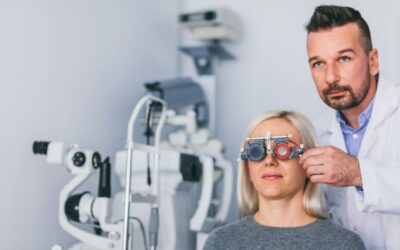As parents, we want the best for our children, and ensuring their eye health is no exception but often overlooked. Schools have never checked children eyes and at most offer a basic screening check only.
Good vision is crucial for their overall development and well-being, but with the increasing use of screens and other modern challenges, it’s essential to take proactive steps to protect their eyesight.
However, there are some tips to care for your children’s eyes, even if they already wear kids’ glasses, such as:
- Encouraging outdoor play
- Limiting screen time
- Using sports eyewear for protection
- UV lenses
- Proper contact lens care
- Allergy treatment
- Regular eye tests
Read on to learn more about how each of these can help protect your little one’s eyes.
Encourage outdoor play
Although the exact cause of Myopia (shortsightedness) is still a cause for ongoing research, one of the factors that impacts the development of Myopia is how much outdoor play time a child is getting.
Spending time outdoors not only promotes physical activity but also helps reduce risk of myopia. Encourage your children to engage in outdoor activities like playing sports, hiking, gardening or simply enjoying nature. The natural light helps in the healthy development of their eyes (with the right UV protection).
Limit screen time
While there is no evidence to suggest screens can cause eye conditions, children who are constantly straining their eyes can develop eye strain (Athentnoia). Symptoms include headaches, tiredness, blurred vision and eye pain.
This can a occur from long periods of:
- Excessive screen time (e.g., watching TV, using smartphones, playing video games)
- Prolonged reading or studying (closer than 30cm in poor light)
- Close-up activities like drawing or crafting for extended periods
- Intense focus on digital devices for homework or educational purposes
- Engaging in detailed tasks such as puzzles or intricate artwork
It is important for parents and caregivers to set reasonable limits to screen time and intense focusing.
Sports eyewear for protection
Sports can be a fun, harmless activity that encourages exercise and time spent outdoors, however, it must be practised safely. Research shows eye injuries are the main cause of blindness in children, with many occurring during sporting activities, especially for children aged 11-14!
43 percent of sports-related eye injuries affect children under 15 years old. Boys aged 11 to 15 face a higher risk, being up to five times more likely than girls of the same age to sustain injuries requiring hospital treatment. So watch those balls and rackets are not hitting the eyes.
If your little one is active in sports, ensure they wear appropriate sports eyewear to protect their eyes from potential injuries. Whether it’s goggles for swimming or protective children’s glasses for sports, the right gear can prevent serious eye damage.
UV ray protection
UV rays don’t just impact the skin, so while you’re lathering them up in suncream during the summer months, it’s important to consider how their little eyes are being impacted by the sun.
Just like sunscreen protects the skin, sunglasses with UV protection shield the eyes from harmful UV rays. Invest in quality sunglasses for your child and encourage them to wear them, especially during outdoor activities.
If they wear corrective lenses, consider speaking to their optometrist about UV ray protection built into the lenses! Also – consider caps and sun hats to provide shade to their eyes when the sun is out! Around 50-70% eye sun damage is done before the age of 18!
Proper contact lens care
Contacts require much more upkeep than glasses, so it is essential that children who wear contacts instead of paediatric eye glasses are taught about proper hygiene and care, such as:
- Wash hands thoroughly before handling contacts
- Only use the contact lens solution recommended by the optometrist
- Never sleep in contacts!
- Replace contacts as instructed to prevent eye infections
- Don’t swim or shower with contacts in!
- Remove contacts if eyes feel irritated and consult an optometrist if problems persist
- Attend regular check-ups with the optometrist to monitor eye health and contact lens fit
Ask your optometrist about how to properly look after children’s contact lenses.
Be aware of allergies
If you notice your child frequently rubbing their eyes, it could be a sign of allergies. Pollen, dust, pet dander, and other allergens can irritate the eyes, leading to discomfort and potential vision problems or keratoconus (cone shaped eye)
We have the prescribing rights to ensure your child is prescribed the correct eye drops to minimise eye allergies. Oral Anti-histamine are useful but most need combination therapy.
Ensure vision health with regular eye tests
Most importantly, even if your kids aren’t showing signs of vision problems, regular eye tests are a must to make sure their eyes are developing in a healthy way! Early detection of any issues allows for prompt treatment and can prevent further complications.
Optometrists not only check for eye problems in children but can also detect issues that might not seem related to the eyes at first glance. During eye tests, they may notice signs of general health problems like diabetes or high blood pressure, which can affect the eyes.
If you’re looking for an advanced children’s eye test to ensure clear vision and eye health for your child, book an appointment with us! We are experts at making children feel at ease, plus, we have a wide range of kids designer glasses for them to choose from!



